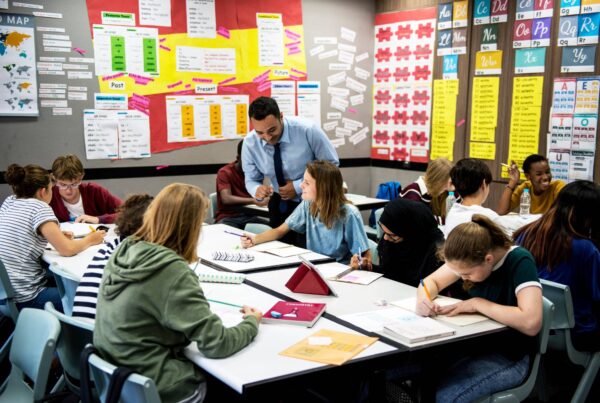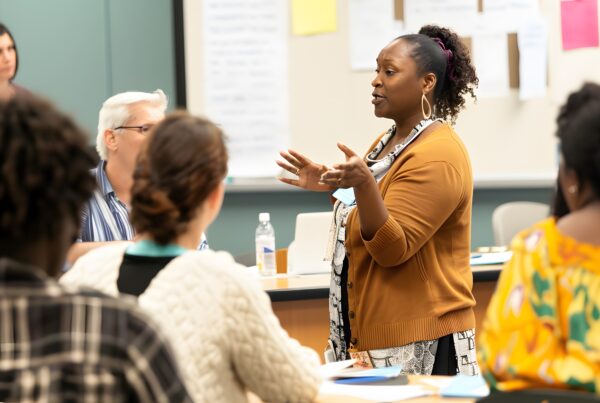
Teachers don’t become experts overnight. They grow their practice through focused, intentional efforts to improve—what researchers call deliberate practice in education.
When teachers take responsibility for their growth, they become proactive learners, continuously refining their instructional strategies to better support student success.
This article explores how school and district leaders can support deliberate practice in education through teacher self-assessment tools like IE Observation, turning evaluation into a collaborative path for ongoing professional learning.
Start with Self-Assessment: The First Step in Deliberate Practice
Reflective teachers regularly assess their own skills to identify areas for improvement. Self-assessment builds awareness, growth, and accountability in instructional practices—core foundations of deliberate practice in education.
IE Observation, the Marzano Evaluation Center’s observation and evaluation platform, includes built-in teacher self-assessment tools aligned to the Focused Teacher Evaluation Model. Instead of trying to tackle every area of instruction at once, teachers can select one of 23 high-leverage strategies to focus on, working toward mastery with clarity and focus.
Why IE Observation?
IE Observation is a web-based platform that reports real-time data from classroom walkthroughs, teacher observations, confidential self-assessments, instructional rounds, and evaluations conducted by school leadership or peers.
IE Observation provides:
- Built-in teacher self-assessment tools aligned to the Focused Teacher Evaluation Model
- Professional development resources
- Efficient reporting to meet state and district compliance
The platform supports both instructional leadership and professional growth. Observers can provide immediate, actionable feedback to teachers—making the process transparent, efficient, and focused on development.
Building Fluency Through Deliberate Practice
Continuous improvement is what keeps teachers evolving toward expertise. Schools and districts can prevent stagnation of student achievement and instructional practice by encouraging teachers to self-assess and establish growth areas. Once teachers identify a growth area, deliberate practice helps them develop fluency. This means practicing a strategy until it feels natural and can be applied with ease.
For example: A teacher focusing on the element “Previewing New Content” within the Focused Teacher Evaluation Model might try different motivational hooks and launch strategies until engaging students becomes second nature.
Through repeated, intentional practice, teachers internalize effective strategies. Even complex strategies begin to feel more natural, freeing up mental bandwidth for teachers to monitor student learning and adapt instruction in real time based on student evidence.
Subscribe for monthly insights about evaluation that leads to measurable growth.
Using Feedback and Reflection to Deepen Deliberate Practice
Deliberate practice in education thrives on evidence. Teachers can strengthen their growth by collecting data on their own instruction through:
- Self-observation evidence, such as video recordings, which allow teachers to review their own instruction and track progress over time.
- Observer feedback, which also allows a teacher to reflect and consider what worked well and what could be improved. Observers should be careful not to simply document anecdotal comments about the teacher’s performance. Instead, actionable feedback focused on expertise in the teacher’s chosen strategy is most effective.
Meaningful, growth-focused discussions between teachers and observers drive deliberate practice efforts. Teachers can walk away knowing where to focus and how to self-improve. The evaluation process shifts from being formal and intimidating to being more open, productive, and collaborative.
IE Observation and the Focused Teacher Evaluation Model are powerful tools for ensuring that feedback is aligned to clear goals, not just generic performance commentary.
Example from a District: How Feedback Loops Support Teacher Growth
Natalie Schneider is the Director of Elementary Education at the Metropolitan School District of Lawrence Township, Indiana. The district has been a partner for over seven years and implements the Marzano Focused Teacher Evaluation Model. She shared about the difference she sees in teacher growth once the district shifted to the model.
“One of the biggest shifts is that teachers feel more supported with the Focused Teacher Evaluation Model because there are multiple opportunities. If they are scored on an element and it didn’t work the way they wanted it to work, there’s an opportunity for the principal to go back in when the teacher makes an improvement. Teachers can say, ‘I would really like for you to come back to my classroom and observe this again, to see if I’ve made some growth.’ It usually always ends up being better than where they were before. Then teachers have an opportunity to see their growth over time.”
Learn more about the Focused Teacher Evaluation Model >>
The Tools to Foster Teacher Growth with Deliberate Practice in Education
IE Observation gives districts and schools a structured, user-friendly way to support teacher growth through deliberate practice. Its self-assessment tools, real-time data, and collaborative feedback loops make it easier for teachers to reflect, improve, and lead their own development in collaboration with observers.
Learn more about how IE Observation and the Focused Teacher Evaluation Model can help you achieve your goals. Talk to an expert about evaluation >>
About the Author
Martha Hightower, Ed.D.
Dr. Martha Hightower serves as the Product Development Specialist for Marzano Evaluation Center. In addition, she delivers professional development to both teachers and school leaders in various schools to improve planning, instruction, and evaluation.
She has extensive experience in education ranging from special education to general education in primary and secondary schools. She also was a school leader for over ten years in Orlando, Florida where she resides. She received a doctorate degree in Organizational Leadership from Nova Southeastern University.
Dr. Hightower is affiliated with several local non-profit organizations and is committed to leading change and helping others develop systems and plans to sustain better living after trauma.
Subscribe for monthly insights about evaluation that leads to measurable growth.
About Marzano Evaluation Center
The Marzano Evaluation Center is the foremost destination to inquire about and receive access to the world-renowned Marzano Focused Teacher Evaluation Model (FTEM). The Focused Teacher Evaluation model, along with our school leader, district leader, and support staff evaluation models culminate in our systemwide approach to evaluation. This comprehensive approach has allowed us to collaborate with school districts to improve their educational outcomes by aiding professionals in attaining useful feedback on classroom and personal performance.




